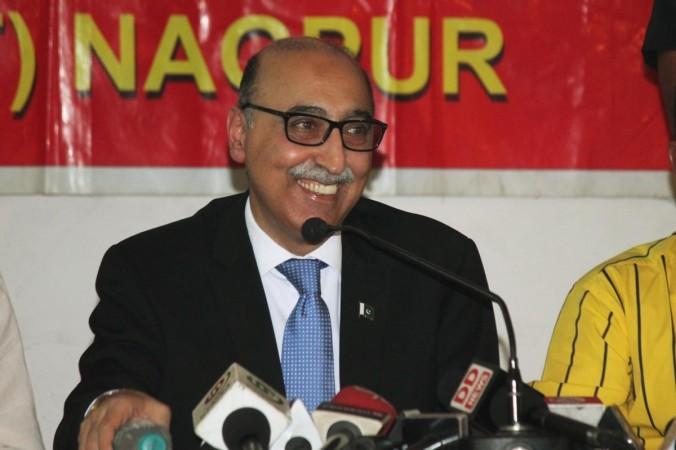
Pakistan High Commissioner to India, Abdul Basit, said on Sunday, which happened to be the Independence Day of Pakistan, that this year the day was dedicated to "Azad Kashmir." His statement assumes importance in light of Prime Minister Narendra Modi's recent remarks that Pakistan-occupied Kashmir (PoK), which the neighbouring country calls "Azad Kashmir," is an integral part of Jammu and Kashmir.
Meanwhile, Baloch activists continued to protests against alleged atrocities committed by Pakistan in the Balochistan region. India has time and again pointed out that while Pakistan calls the insurgency in Jammu and Kashmir a freedom struggle, it carries out an oppressive rule in Balochistan, which had declared independence three days before it — on Aug. 11, 1947 — but continues to be occupied by Pakistan.
Speaking in Delhi on Sunday, Basit said: "Is saal ki Jashn‑e‑Azadi hum Kashmir ki Azadi ke naam karte hain [We dedicate the Independence Day celebrations of this year to a free Kashmir]." However, he also said: "Pakistan has always made efforts to improve its relationship with India."
Basit's dedication to a free Kashmir comes in the backdrop of Modi's recent statement in an all-party meeting on the issue that PoK was an integral part of Jammu and Kashmir. His statement was followed by that of Minister of State for Prime Minister's Office Jitendra Singh, who said on Saturday: "The actual culmination of the 'Tiranga yatra' will be in Kotli and Muzaffarabad when we succeed in hoisting the tricolour of India in PoK."
Meanwhile, Baloch activists continued their vociferous protests against Pakistan occupation of the region. Brahumdagh Bugti, who is the founding chief of the Baloch Republican Party, in an interview to ANI, detailed the atrocities committed by Pakistan on the Balochi people.
He said: "People who protest are harassed so that they migrate from Balochistan. This operation [by the Pakistani military in Balochistan] has been gaining momentum for many years. Their (the Pakistany Army's) aim is to gradually bring in Chinese companies for deep drills in Balochistan."
Bugti went on to add: "These talks of a committee [to look into the problems of the Balochi people] being set up is all just misinformation to escape questions raised by the media. Pakistasn's main focus is on Dera Bugti and Gwadar, where they have set up an Army cantonment to counter public reactions."
He said of the alleged genocide in Balochistan: "Not a single week passes by without a mysterious disappearance, abduction or recovery of bodies. They used to abduct, torture and release people earlier. Now, they abduct, torture and dump the bodies."
Mehran Marri, the Baloch representative to European Union and the U.N. Human Rights Council, told ANI the situation in Balochistan was as grave as ever. He said: "The Pakistan Army's operation [against the Balochi people] has been going on unabated for decades, but its intensity varies from time to time. However, the Pakistani military has increased its activities in Balochistan since Nawaz Sharif's government came into power in the country."
Marri echoed what Bugti had said: "Baloch youth are getting abducted on a routine basis, and people are raising their voice against it." He also said: "Pak has always been scared of people like us coming to the U.N. and informing the world about the genocide and human rights violations in Balochistan."
Marri said something else that should be of concern to India. He said: "China is as great a threat to the Baloch people, Baloch nationalism and Baloch resources as Pakistan is. China is spreading its tentacles in Balochistan very rapidly, and that is why we are appealing to international community."
If China indeed spreads its influence to Balochistan, India might have to deal with military advances from that country from yet another front.

















